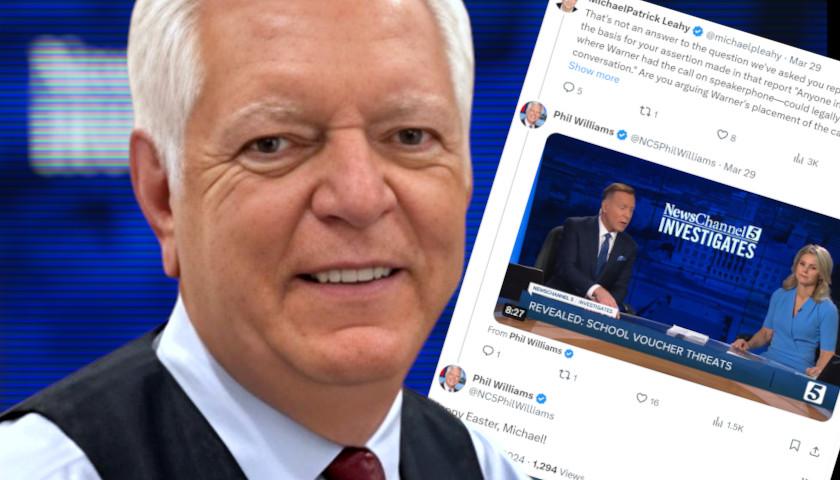Live from Music Row, Wednesday morning on The Tennessee Star Report with Michael Patrick Leahy – broadcast on Nashville’s Talk Radio 98.3 and 1510 WLAC weekdays from 5:00 a.m. to 8:00 a.m. – host Leahy welcomed Tennessee State Senate Majority Leader Jack Johnson in studio to explain the process by which the Governor’s legislation is carried.
Leahy: In studio State Senate Majority Leader Jack Johnson is here in studio for this last segment. You got to go up to do some business.
Johnson: I’ve got to get to work. I work for the people in Williamson County. I got to go clock in.
Leahy: I know you’re not going to be able to stick around for News Potpourri, but you can make it there in time. It’s close to here.
Johnson: It’s a very long drive. (Chuckles)
Leahy: But I wanted to take this last segment here, Jack, to talk to you a little bit about the process by which the state legislature reviews the budget proposal set forward by the governor in the State of the State Address. And it was a long list of things that he wants to accomplish, and some of them, I think, like the transportation infrastructure are very promising, depending on the details. And then other things like this $350 million for sports facilities in Memphis.
I don’t like that at all. But tell us what the process is where you as a state Senate majority leader, and how you work through that process, what your relationship with the governor is, what your duties are, and then what that back room conversations are.
Johnson: The way the process works in Tennessee is the elected leader who is the leader of the party, of the governor. So we have a Republican governor. So the Republican leader in the Senate and the Republican leader in the House are the sponsors of everything the governor would like to do from a legislative standpoint.
Leahy: When you say the leader, you talk about the majority leader.
Johnson: In this case it is, but let’s say we had a Democratic governor and we had a Republican majority in the legislature. Then it would be the Democratic leader or the minority leader who would be the sponsor of the governor’s legislation. But in this case, you’re right. We have a Republican governor and we have a Republican majority.
Leahy: But it’s not Randy McNally and it’s not Speaker Cameron Sexton, Randy McNally, the president of the state Senate and our lieutenant governor.
Johnson: Correct.
Leahy: Or the Speaker of the House Cam Sexton. It is the majority leader in the House, William Lambert and the majority leader in the state Senate that’s you, Jack Johnson. Why is it that the governor’s legislation is not carried by the Speaker of the House or the state Senate president?
Johnson: Sure. We have the speaker of the Senate, Lieutenant Governor Randy McNally. We have the speaker of the House. They are elected by their chamber. So they are the presiding officer, if you will, over the House and then over the Senate. My role is more of a partisan role, even though certainly Randy McNally is a Republican. Cameron Sexton is a Republican. They are elected by the body.
Leahy: They handle the entire body, meaning all the Democrats there as well as the Republicans. Therefore, they could not be the partisan sponsor of these bills that the Governor wants.
Johnson: Typically not. And it’s very unusual for the Speakers to file legislation with their name on it. My role, and Leader Lambert’s role, is to basically be the liaison, if you will, for our majorities in both the House and the Senate.
And so when the Governor has something he or she would like to have done, be it a legislative initiative or the budget, and I’m the sponsor of the budget in the Senate, leader Lambert is the sponsor of the budget in the House. And so it’s our job to shepherd that legislation through.
I always want to point out that it’s also our job to go back to the Governor and say, hey, this is not getting a favorable reception. It’s getting a bit of a cool breeze here on what you’ve proposed, Governor. And so we work through all that. We have those conversations.
Leahy: So have you had those conversations in the previous budget year with the Governor? And he said, you know, State Senate Majority Leader Jack Johnson, you have a point. Let’s take that off for this year. Have you had that happen?
Johnson: Absolutely. And I’ll say this about Governor Bill Lee. He is a collaborator. He wants to work in partnership with the General Assembly. We’ve had those conversations, and I’ve had to go back to and say, hey, I don’t think we can get the votes to do X. We can do Y and Z, but I can’t get the votes to do X.
And so we’ve modified or changed whatever he is wanting to do. The budget is the most important bill we pass every year. It’s actually the only constitutionally required piece of legislation we have to pass every year. The way the Constitution lays it out, the Governor is required to propose a state budget, which he did on Monday night, and he delivers a budget document.
And that’s a proposal, and that’s a starting place. He has weeks and weeks of budget hearings with all the various agencies and departments of the government, and they come with their budget needs and say, hey, Governor, we need more money to do this, or hey, we’re able to save some money by not doing this.
And he puts together a budget proposal and then that is presented. And actually, yesterday morning, the Commissioner of Finance and Administration, Jim Bryson, my predecessor in the State Senate ran for Governor back in 2006, which is the year I ran for the Senate seat.
So, a great friend. And he did an extensive and more in-depth presentation of the Governor’s proposed budget. So there’s an old saying, though. The Governor proposes the General Assembly disposes. And so that budget proposal, we will now have hearings. We’ll have testimony.
All the different departments and state government have to come in and make their independent budget proposal that is included in the governor’s budget. We ask questions, why are you spending money on this? Why can’t you save money by doing this?
And it’s a very grueling, in-depth process, but it should be because we need to go through that budget with a fine tooth comb. And we do, both in the House and the Senate. And later in session, there will be an amendment. We call it the budget amendment that usually comes in March sometimes or sometime in March.
And that’s where the governor maybe wants to change a few things. And then ultimately the legislature can take things out of the governor’s proposed budget, put things in, change it, modify it. But it’s done collaboratively with the governor and his staff. It’s a very effective process.
Leahy: So, you are sitting there for the State of the State and listening, the night before last Monday night, and as you listen to the speech, do you hear proposals that you say, well, that’s interesting, I wonder what that’s all about? Does that happen?
Johnson: It does. And we get a briefing prior to the governor’s State of the State, legislative leadership does. So we have a pretty good general idea of what’s in there, but it’s always good to hear the governor lay out his vision.
(7:30)
– – –
Tune in weekdays from 5:00 – 8:00 a.m. to The Tennessee Star Report with Michael Patrick Leahy on Talk Radio 98.3 FM WLAC 1510. Listen online at iHeart Radio.








